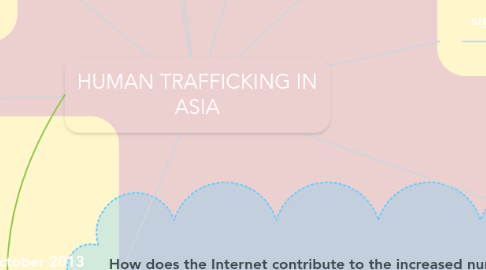HUMAN TRAFFICKING IN ASIA
저자: Valencia Jericka Mae


1. Southeast Asia
1.1. has a growing population of over 600 million and internet users have doubled.
1.2. Human traffickers have an increasing number of targets online
2. Trafficking networks seek children for:
2.1. illegal adoption
2.2. commercial sexual exploitation
2.3. drug trafficking
2.4. drug trafficking
3. February 2014
3.1. Chinese authorities rescued 382 babies arrested more than 1000 people suspected of buying and selling young children online
3.2. Arrested more than 1000 people suspected of buying and selling young children online
3.3. Found over four websites, online forums, and some 30 groups on a popular Chinese messaging platform.
4. October 2013
4.1. Taken Campaign launched the first anti-trafficking mobile phone application to mark Anti-Slavery Day in London
4.2. was developed by RedLight Traffic in the US
4.3. Along with the Polaris Project (a US-based NGO), the app provides users with potential trafficking indicators and red flags to identify victims, a 20-minute training exercise to recognise trafficking, an anonymous way to report suspected cases to local authorities, and a sharing tool to establish a local community network against human trafficking.
5. How does the Internet contribute to the increased number of human trafficking cases? Do you think that the internet can be used as a tool to victimize people? Explain your answer.
6. UNODC Global Report on Trafficking in Persons
7. East Asia and the Pacific account for nearly 40 percent of detected child victims
8. ‘4P’ strategy of prevention
8.1. Developed by Singapore for National Action Plan 2012-2015
8.2. Stands for: prosecution, protection and partnership
9. What is the percentage of child victims of human trafficking in the ASEAN Region?
10. Presented by Group 4:
11. Valencia, Jericka Mae F.
12. Alintanahin, Lloyd F.
13. Castañeda, Kurt Anthony F.
14. Elemos, Christian Kelly G.
15. March 2014
15.1. World Tourism Organisation (UNWTO), UNODC and UNESCO joined forces to promote a global campaign, ‘Your Actions Count — Be a Responsible Traveller’.
15.1.1. supported by Marriott International and Sabre Holdings to promote throught their website (Travelocity and lastminute.com), their TripCase mobile app and GetThere booking tool.
16. Children under 18 using online social media platforms
16.1. receive and accept friend notification from an unknown person
16.2. Meet after continued social media interaction
16.3. This is how an estimated one quarter of children get trafficked in Indonesia
17. Was there progress in the fight to stop human trafficking after ASEAN signed the Declaration Against Trafficking in Persons, Particularly Women and Children?
18. signed by ASEAN
18.1. Declaration Against Trafficking in Persons, Particularly Women and Children
18.1.1. no significant progress on implementing the Declaration has been made
18.1.1.1. this is because East Asian countries are a major source for long-distance, transregional trafficking
19. Suggest at least 3 ways to help stop human trafficking.
20. Learn the indicators of human trafficking so you can help identify a potential trafficking victim.
21. Be an advocate and partake in anti-human trafficking activities.
22. Host an awareness-raising campaign through social media about human trafficking.
23. Technology-facilitated trafficking is more broad and adaptive, thus with internet it can easily fool people into joining in suspicious activities. With the access of Internet, trafficking networks seek children for illegal adoption, commercial sexual exploitation, drug trafficking and child labour. Yes, internet can be used as a tool to victimize people due to its easy access feature. However, internet users should also be responsible and be precautionary about it. As the saying says, think before you click.
24. 2012 Operation Endeavour
24.1. an Australian, UK, US and Filipino law enforcement
24.1.1. used online tools such as data mapping
24.1.1.1. led to 29 international arrests, 11 of which were in the Philippines
